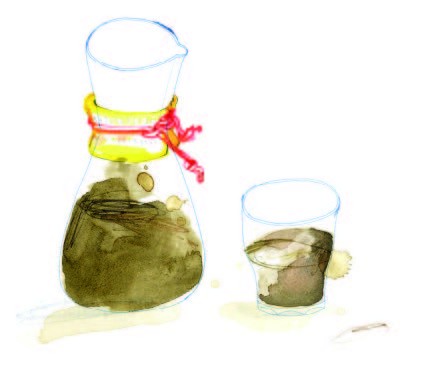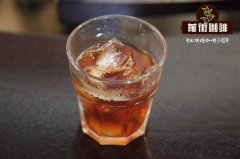Cold Brew cold coffee is not iced coffee! What on earth is cold coffee?

Professional coffee knowledge exchange more coffee bean information please follow the coffee workshop (Wechat official account cafe_style)
We can often drink iced coffee (iced coffee), but in fact iced coffee is not equal to cold extracted coffee (cold brew). We all know that iced coffee was very popular in the last coffee generation, whether with sugar, whipped cream or flavored syrup, all kinds of iced coffee were indispensable stars in coffee chains, but they were not cold coffee. Iced coffee is usually extracted by an Italian coffee machine, with hot espresso as the base with ice cubes, and then mixed into your favorite flavors. On the other hand, the cold coffee we have in mind must be extracted with ice water, which is completely different from ordinary iced coffee.
Making coffee with ice water or cold water can be traced back to Japan, commonly known as "Kyoto Wind Coffee" (Kyoto-style coffee). The method of cold water extraction of coffee was very popular in Kyoto at that time, so it was named. As early as the 17th century, the Japanese began to use cold water with different cold extraction methods to make coffee, and they would use follicles or dripping methods to make coffee. This method and method of extraction has evolved to this day. There appeared like the most fashionable ice drop coffee pot with the same design as the boutique.
It is generally believed that it was the Dutch who first came up with the cold extraction method, and then spread to Japan. At that time, the Dutch would ship coffee back to Europe from the colony of Indonesia, and invented a way to make cold coffee because there was no hot water on board. Interestingly, at that time, people thought that cold coffee was mild and did not hurt the stomach, but they did not know that hot water would extract more acid from coffee, while cold coffee was less sour.
Cold coffee has not become popular in the United States until recent years, so we all know that coffee does not have to drink hot, soaked in cold water or dripping, can also extract good coffee. As for Europe, it may be a while before they begin to fall in love with this new power of coffee.
There are two main reasons for the rise of cold-extracted coffee. One is that the younger generation prefers mild coffee and is less receptive to traditional espresso. On the other hand, mild coffee is more in line with the concept of health and health, while cold-extracted coffee has a lower bitter taste and has a mild sweet taste, which means that cold-extracted coffee does not need to add additional sugar or dairy products to reconcile its flavor and can be drunk in the most natural and burden-free conditions. Whether you like it or not, the trend of cold coffee can be said to coincide with the concept of health that everyone attaches great importance to now.
As cold-extracted coffee becomes more and more popular, we can find that more and more related products are being bottled up to lock the pockets of coffee lovers. Nitrogen coffee (nitro cold brew) is the latest way to drink. The injection of liquid nitrogen gives the coffee a fine bubble, just like a strong black beer, and the texture of the coffee will become quite smooth and smooth, with a creamy taste.
* this article is reproduced from "Cold Brew Cold Coffee: the basic method of mastering the New trend of Fine Coffee, from picking beans, Grinding, basic equipment to extraction, and further innovating the Classic invincible Formula of fancy Coffee, Wine blending and dessert" (by Chlo ë Callow, Building Block Culture Press)
Important Notice :
前街咖啡 FrontStreet Coffee has moved to new addredd:
FrontStreet Coffee Address: 315,Donghua East Road,GuangZhou
Tel:020 38364473
- Prev

Panamanian Hartman's Flavor and Taste Characteristics? What kind of plant?
Professional coffee knowledge exchange More coffee bean information Please pay attention to coffee workshop (Weixin Official Accounts cafe_style) Panama Hartman flavor and taste characteristics? What kind of plant? In recent years, the annual International Cup competition and bidding "Best of Panama" and the emergence of Panama's Emerald Estate (Hacienda La Esmeralda ) have been completely changed.
- Next

What is the planting history and taste trend of Hartman Manor in the Walken area of Panama? What kind?
Professional coffee knowledge exchange more coffee bean information please follow the coffee workshop (Wechat official account cafe_style) the planting history and taste trend of Hartman Manor in Walken area of Panama? What kind? Producing area: Vorkenbaru volcanic area, Panama: Catuai, Caturra, Pacamara, Typica, Maragogype, Bourbon, treatment methods:
Related
- Detailed explanation of Jadeite planting Land in Panamanian Jadeite Manor introduction to the grading system of Jadeite competitive bidding, Red bid, Green bid and Rose Summer
- Story of Coffee planting in Brenka region of Costa Rica Stonehenge Manor anaerobic heavy honey treatment of flavor mouth
- What's on the barrel of Blue Mountain Coffee beans?
- Can American coffee also pull flowers? How to use hot American style to pull out a good-looking pattern?
- Can you make a cold extract with coffee beans? What is the right proportion for cold-extracted coffee formula?
- Indonesian PWN Gold Mandrine Coffee Origin Features Flavor How to Chong? Mandolin coffee is American.
- A brief introduction to the flavor characteristics of Brazilian yellow bourbon coffee beans
- What is the effect of different water quality on the flavor of cold-extracted coffee? What kind of water is best for brewing coffee?
- Why do you think of Rose Summer whenever you mention Panamanian coffee?
- Introduction to the characteristics of authentic blue mountain coffee bean producing areas? What is the CIB Coffee Authority in Jamaica?

